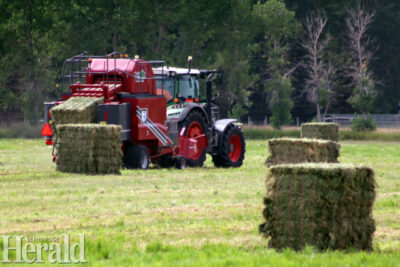Agriculture Policy Framework not ambitious enough, says farm union
By Lethbridge Herald on August 18, 2022.
 Herald photo by Al Beeber
A farmer bales hay just south of Coaldale recently as harvesting season is underway in southern Alberta.
Herald photo by Al Beeber
A farmer bales hay just south of Coaldale recently as harvesting season is underway in southern Alberta.Justin Seward – LETHBRIDGE HERALD
Federal, provincial and territorial ministers of agriculture met in Saskatoon this month to reach an agreement in principle for a five-year commitment to an Agricultural Policy Framework (APF).
The APF, which has been rebranded as the Sustainable Canadian Agricultural Partnership, is a policy that provides direction to make sure Canada is a leader in “environmentally, economically and socially sustainable agriculture,” as per the release.
However, the National Farmers Union feels that the latest APF only partially meets the worthy and urgent goals and is not ambitious enough to address the increasing economic and climate risk that Canadian farmers face.
NFU was pleased with the funding through the APF, as there is a 25 per cent increase in cost share funding.
“We were pleased to see an increase in the actual funding,” said Katie Ward, NFU president.
“You know $500 million of that is new money (of the $2.5 billion over five years), which we’re pleased to see.”
NFU is also pleased to see the introduction of $250 million for a Resilient Agriculture Landscape Program.
“We have really ambitious climate goals and know there’s lots of actions that government can take to help incentivize farmers to reach those goals,” said Ward.
“This is one of the things that we’re quite pleased about.”
While the NFU felt the commitment to reducing greenhouse gas emissions from three to five metric tonnes by 2028 isn’t enough, Ward feels there is still mitigation potential for marginal wetlands and farmlands that isn’t as productive.
“It’s got immense potential and we really need to incentivize farmers not to farm every extra acre that they can, but to preserve some of that biodiversity space. So that’s a start,” said Ward.
NFU was enthused with the increased compensation rate for the Business Risk Management program from 70 to 80 per cent.
Ward said it’s still not back up to the levels that it used to be.
“So we wished that there had been a little bit more space for agreement amongst the federal, provincial and territorial parties there,” she said.
“It’s a step in the right direction,” said Ward.
The federal government has also committed to reducing emissions from nitrogen fertilizers by 30 per cent by 2030.
While NFU agrees with the decision on the near-term goal, their concern lies is that the message around fertilizer emissions reduction doesn’t align with the emergency level of climate crisis that is being faced and factoring in that the agriculture sector is the fourth highest greenhouse gas-emitting industry category in the country.
“I think that there is an awful lot of misinformation floating around about that right now,” said Ward.
“… There’s a lot of folks that are spreading information that it’s regulated and mandatory cuts in absolute fertilizer usage and that is simply not the case. So I think that here’s a lot of space to increase communications around this. But every environmental program is going to be so key for farmers to be able to do our part.”
The APF also includes an increase in funded recipients for those who identify as Indigenous, women, and youth.
“The NFU has long prioritized representation of women and youth in agriculture, and, having recently enshrined representation for BIPOC farmers in our constitution, we plan to engage with government to ensure that equity-deserving groups have a seat at the table in designing programs affecting their communities,” as read in the release.
“The APF is vague on how it will support BIPOC and youth agriculturalists. The NFU believes we need to move beyond mere ‘sector participation’ and provide meaningful support for BIPOC and youth to become full farm owners and operators who are given the tools and resources to grow culturally appropriate foods and agricultural products for their communities.”
The APF will also see a commitment to ensuring a skilled and reliable workforce in the agricultural sector as well as retail fees, regulatory priorities/interprovincial trade, animal health and trade and market access.
“I think it’s going to give us the tools we need as farmers to really implement some carbon-friendly farming practices that are going to increases our competitiveness,” said Ward.
More information can be found at http://www.nfu.ca.
27-26




